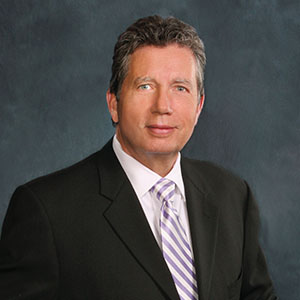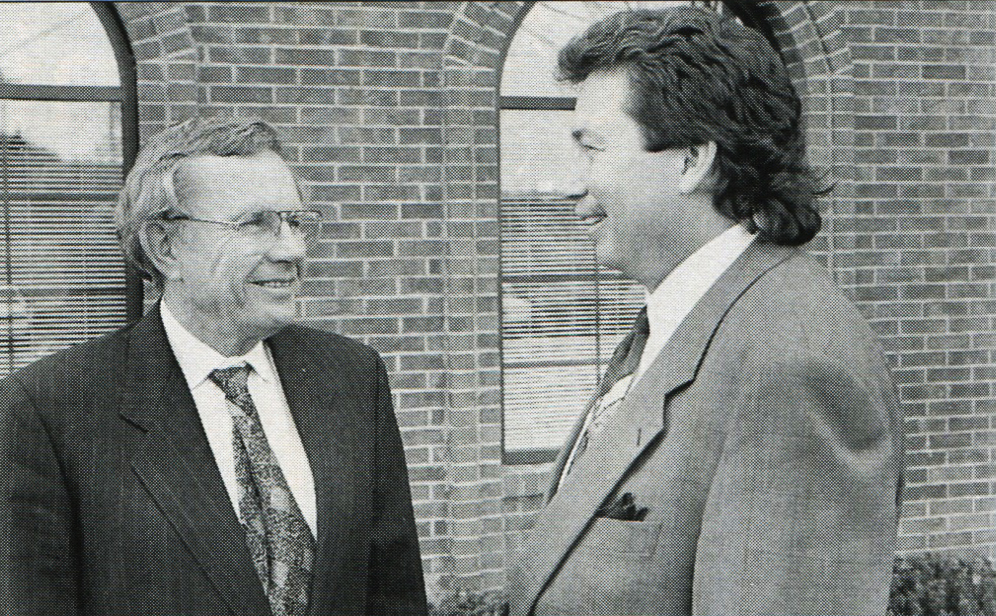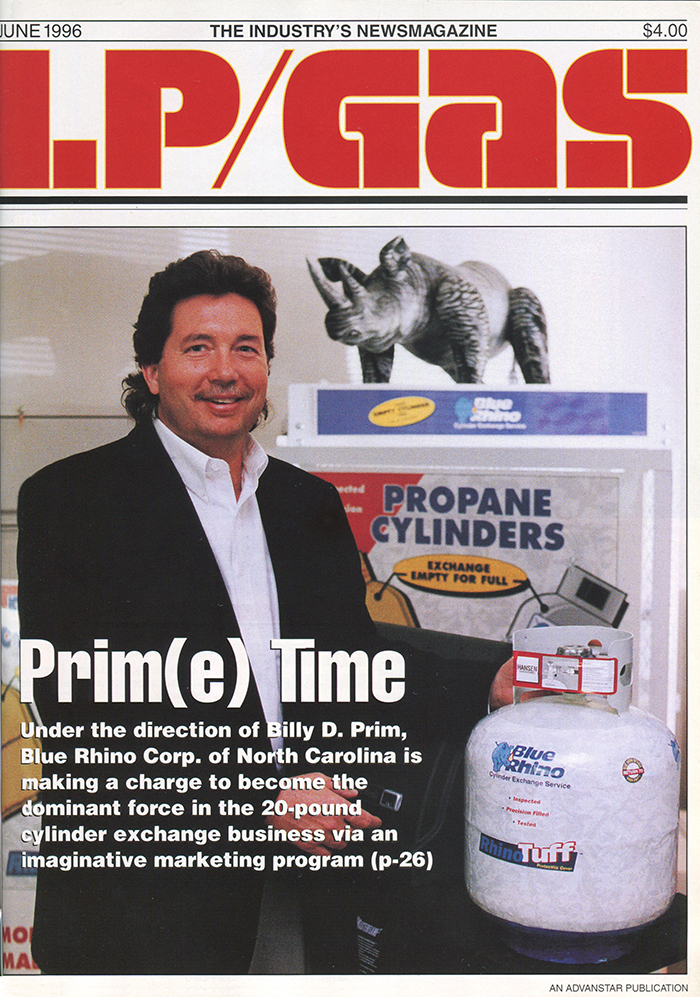LP Gas Hall of Fame profile: Billy Prim
The 2023 LP Gas Hall of Fame dinner and induction ceremony will take place April 22 at the Omni Nashville Hotel in downtown Nashville, Tennessee. Inductees are Steve Ahrens (Missouri Propane Gas Association), Tom Jaenicke (ATomiK Creative Solutions), Billy Prim (Blue Rhino) and Don Schultz (Schultz Gas Service). Get more information here.

Prim
A trip to Paris, an African safari, hours in a plane and precious time to write a business plan: Billy Prim was about to build a propane industry company into a recognizable brand that would meet the needs of a wide range of consumers.
But before Blue Rhino Corp. would become the largest propane cylinder exchange company in the U.S., Prim had to assemble the pieces in his mind.
He had to witness the exchange concept, with butane, while vacationing with his wife, Deborah, in Europe – how companies were taking cylinders back to a centralized processing center for refurbishing and refilling in a controlled environment before sending them back into the field.
He had to witness the sturdy build of a rhino while on a photo safari – how it looked to him like a tank and how it sparked an idea for a unique company name.
He had to raise the capital and build the partnerships to fuel the growth before he could sit back and watch the company take off.
Prim’s entrepreneurial vision would eventually become a reality with Blue Rhino’s launch in 1994 and its sale 10 years later to Ferrellgas. His efforts on a national scale to put propane and propane products front and center for consumers, in their backyards and on patios throughout the country, earned him induction into the LP Gas Hall of Fame.
Business acumen

Billy Prim of Blue Rhino, right, and Darrel Reifschneider of Manchester Tank. (Photo: LP Gas archives)
Prim thought big from the beginning.
“I was telling people I was going to be nationwide,” he says. “I don’t think anybody believed me.”
Prim grew up in the small town of Boonville, North Carolina, about 30 miles west of Winston-Salem, and developed an interest in business while watching his father and grandfather lead the family’s farm supply company. Prim planned to attend North Carolina State.
But when his father died unexpectedly and his grandfather committed suicide, Prim left school as a freshman to take care of his mom and two younger sisters. The family sold the business and Prim returned to school, pursuing a Master of Business Administration from Wake Forest University.
Prim’s first big step in the business world came when he founded American Oil & Gas Co., a regional petroleum marketer, in Boonville. It included a retail propane operation, a chain of convenience stores and a trucking company, and it would serve as a launch pad for his national aspirations.
In 1989, after hearing about several successful 20-pound cylinder exchange ventures, Prim decided to set cages outside some of his local convenience stores. In the coming years, he added hundreds of sites across North Carolina, South Carolina and Virginia. In 1993, he drew the attention of a local Walmart manager who needed a place to send grill customers for gas. Discussions with Walmart and Lowe’s turned to the possibilities of a national program.
“It became readily apparent that we had a golden opportunity to launch a successful national venture,” Prim told LP Gas in 1996.
When Prim saw the opportunity with Blue Rhino, he sold the propane division of American Oil & Gas to Suburban Propane and invested the money in his new venture.
“I saw an opportunity to solve a problem that people had, and I believed in the growth of gas grills over charcoal grills,” says Prim, 67, regarding a more efficient method for consumers to replace empty grill cylinders instead of refilling them. “I believed the growth in outdoor living was something I could take advantage of.”
Bullish on gas grilling

Billy Prim graced the cover of LP Gas magazine in June 1996. (Photo: LP Gas archives)
Prim felt he had an edge in two areas, one being that his business plan centered on the relatively new concept of cylinder exchange. The other was the continued push by manufacturers to expand the availability of backyard gas grilling products.
At that time, he says, five major retailers – Home Depot, Kmart, Lowe’s, Sears and Walmart – sold about three-quarters of all gas grills in the U.S.
“Charcoal grills were transitioning to gas grills,” he explains, “and if I could capture all the places that sold gas grills, I could make them into loyal customers of mine.”
Prim got all five retailers on board and recognizes the feat – taking the cylinder exchange concept to big box retailers that sold grills – as one of his most significant accomplishments.
Blue Rhino often ran programs with the retailers, giving consumers a propane cylinder with their new grill. Drawing consumers’ attention to propane cylinder exchange as they bought their first gas grill was “our key to success,” Prim says.
“We were one of the few companies that tried to build a brand around it with the Blue Rhino,” he says. “Instead of just being a commodity business, we felt like we could establish a brand in the way that we would refurbish our cylinders. People would look for the Blue Rhino when they came back to exchange the second time.”
Prim laughs as he recalls the early reaction to the company name. The logo illustration features a rhino, with the blue representing propane and a flame on its nose.
“People in the industry thought I was way out there,” he says. “It was not the traditional propane company name, that’s for sure.
“But I had a purpose. I was trying to do for us what the Pink Panther did for Owens Corning and trying to brand it, give it a symbol that people would recognize and remember. And it worked.”
Out of the gates quickly
Prim knew Blue Rhino had to be “convenient to the masses” for the business to work long term, with consumers having access to exchange cylinders at convenience and hardware stores across the country in addition to the big box outlets.
“I was going to methodically build refurbishing centers and distribution centers around the country,” says Prim, “but as I started, the concept really took off.”
He soon realized that he couldn’t build Blue Rhino’s infrastructure fast enough to meet the demand, and the rapid early growth challenged the company’s capital structure. So, in 1998, Prim took Blue Rhino public so it could access enough capital to match the speed of its growth. He calls the growth process the most fun part of the business.
Prim employed leaders from inside and outside the propane industry to grow the business, including its network of propane distributors. Blue Rhino became the largest operator of propane tank exchange services in the U.S. with more than 29,000 retail locations in 49 states and Puerto Rico. It established locations at home improvement centers, mass merchants, and hardware, grocery and convenience stores.

Blue Rhino has grown to more than 60,000 locations across the U.S. (Photo: Ferrellgas)
Blue Rhino also expanded into products that used its cylinder exchange service, including grills, patio heaters and fireplace accessories.
Prim says he looked to take Blue Rhino beyond the U.S. and Canada but found the model did not work internationally because of governments’ involvement in the petroleum product markets.
He also had an interested buyer in Ferrellgas, which recognized propane cylinder exchange as the fastest-growing portion of the retail propane industry. In 2004, the company acquired Blue Rhino for $340 million and appointed Prim to its senior management team and board of directors, on which he served for several years.
“Billy is an entrepreneur in every sense of the word,” Ferrellgas CEO Jim Ferrell said at the time. “He has built this business from scratch by developing a tremendous distributor network.”
That same year, Prim founded Primo Water using the same exchange concept – only this time with 5-gallon bottles of water. Today, the public company operates in North America and Europe and generates more than $2 billion in annual revenue.
Meanwhile, Blue Rhino has grown to more than 60,000 locations across the U.S.
















